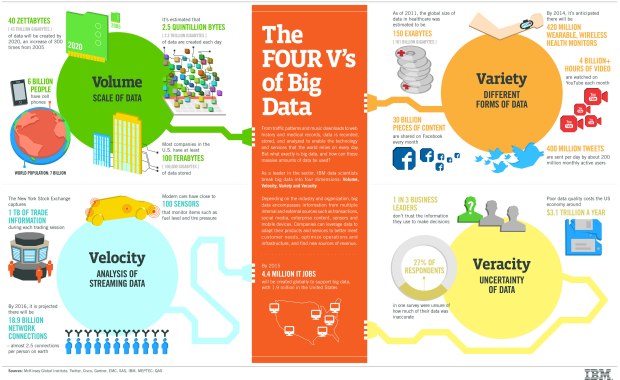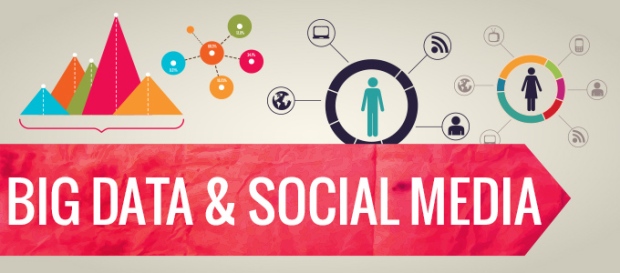At the very first moment to read my blog post, do you really understand what does it mean by “Big Data” ?
Dan Ariely explained on Facebook and received 2.6k hot discussions. “Big data is like teenage sex: everyone talks about it, nobody really knows how to do it, everyone thinks everyone else is doing it, so everyone claims they are doing it…”
So, to correct the common misunderstanding and to not only mention the size of data, I would say, in short, that big data usually includes 4 V’s – Volume, Velocity, Variety, and Veracity.

I will not walk you through so much in detail about big data, but I am more interested to provide insights about how to leverage big data in smart way for marketing.
1.What’s good about the big data in marketing?

We can not deny the fact that Big Data is Revolutionizing Marketing and Sales. To name a few, big data is helpful to attain price optimization, increase the quality of sales leads, improve the territory planning, win decision maker engagement strategies, improve CRM systems, optimize the advertising content and etc. As we all know that Amazon uses advanced algorithm to optimize its recommendation system and Target also uses customer’s history of buying pregnancy related goods to seize the opportune moment for promoting new-baby goods. Also, as recent moves in the personal insurance market show, big data also tailors price offers to individuals’ revealed habits to replace large-group risk pooling. Recently, I was fascinated by the Ad Tech services of big data marketing solution, such as Personagraph owned by Intertrust Technologies, a powerful programmatic marketing platform which provides support to reconcile existing user data with its platform. I saw the power of big data in managing multi-party data, enabling precision advertising, and improving in-target campaign performance. However, there are still several factors to slow down and limit the development of big data.
2. What are the limitations and problems?

There are lots of limitations and problems of big data in marketing, such as there is biased user data because of the lack of representative target consumer base, user-level algorithms have difficult answering “Why” if use the algorithmic method, there is much more noise of misleading data and etc. From my perspective in macro way, the hinder for the development of big data is the lack of experienced data scientists and regulation.
- Have you ever noticed that the same few examples really achieved Big Data Success? Maybe you can easily name some companies such as Amazon, Tesco, and Google but we talked about these brands over and over again. That is because they are still relatively rare. The limitation comes from the shortage of data scientists. Even though 2011 McKinsey & Company’s Business Technology Official report claimed 5 years ago that ”The United States alone faces a shortage of 140,000 to 190,000 people with deep analytical skills as well as 1.5 million managers and analysts to analyze big data and make decisions based on their findings,” the demand for data scientists is still so large to fill the gap nowadays.
- Also, there might still a problem – lack of law for Data Anonymization. As the name suggests, data anonymization is a data privacy technique that seeks to protect private or sensitive data by deleting or encrypting personally identifiable information from a database to ensure privacy. But it might not achieve the ideal effect. There is still much criticism towards Data Anonymization. According to Ken Wheaton, “Data anonymization is also a clever bit of technical and verbal misdirection used by marketers and tech people to keep regulators at bay.” Marketers advocate to anonymize consumer data but “They wave a magic wand over it, like put it under a bunch of cups and move it all around.” In most cases, marketers only take off the name or address. So people blame that the problem remains unsolved due to the lack of law and call on the data-breach regulation.
3. Can we trust every bit of data we get?

Absolutely not. I believe you already have your answer in mind. Nowadays, it is not hard to collect data, but do data really create certain value ready to use? And will bits of data tells exactly the story? I doubt so. As we all knew the American President Election of 2016, there’s been a lot of fingers pointing at Facebook, arguing that their newsfeed algorithms played a major role in spreading misinformation and magnifying polarization. Facebook laid off the staffs who were in charge of writing the “Trending news” and ran the trending stories box as an automated feature instead. But that hasn’t worked so well. So the lesson here is that data can be superficial, sensationalistic, or outright inaccurate.
4. Is data alone enough to make a marketing decision?
My answer is not. The data we gathered, in many cases, is not enough to make marketing decision, let alone humans still play a role in many business decisions.

People now are impressed by the scale of social media sites like Facebook and Twitter which act as the tip of ‘social’ iceberg. It is easy to measure but you might not know, there is not enough referral data, which causes the phenomenon of “Dark Social.” According to new data on many media sites, 69% of social referrals came from dark social. 20% came from Facebook. The truth of nowadays web analytics is that the vast trove of social traffic is essentially invisible to most analytics programs. Sometimes “You show up at the doorstep and the company has no idea how you got there.” It occurs often in email programs, instant message and some mobile applications.
If the data is solid, the next question would be do we trust the data and ask the right questions? Humans might be wrong in the modeling built, assumptions or conclusions. So think twice and sometimes ‘play devil’s advocate’ is necessary to assess every possibilities. As Kaan Turnaili claims:
In business, better-informed decisions often start with a strong appetite for data, followed by a healthy dose of skepticism for it. . If available, our collective insight becomes the guiding light for our decisions enhanced by data. In the absence of it—when we are left to decide by ourselves—we seek wisdom in our own experiences to fill the void where we can’t find or rely on data.
5. What aspects should marketers pay more attention to about big data?

Let’s go back to the marketing and sales. Inspired by the article “Don’t Let Big Data Bury Your Brand, ” I can’t agree more that marketer should focused more on the right long-term goals to leverage big data to build brand instead of only achieving short-term sales. If analytics-drive promotions are programmed to maximize sales in the short run, it might be destructive for brand. First the system will always push to a give customer whatever that customer has ordered most often so other offers have a lesser chance of promotion, which decrease the “repertoire” and thus loyalty. Second, for the long run effect, over automated media buying and ad placement might occur. Marketers should always think about the how components to drive brand perceptions and where investments will have the most impact.
Last but not least, branders and analysts should collaborate with each other. In short, big data is instrumental to brand building, and it should be done right.

1 Comment